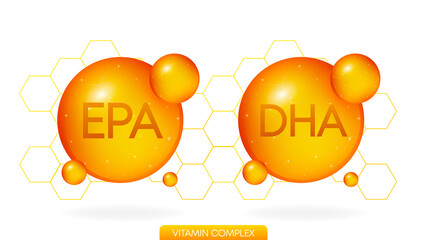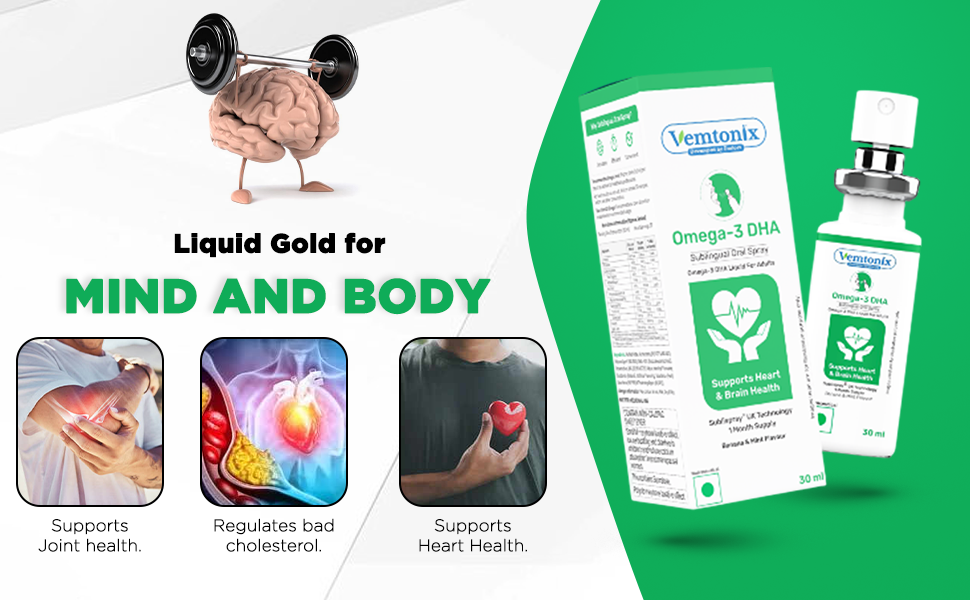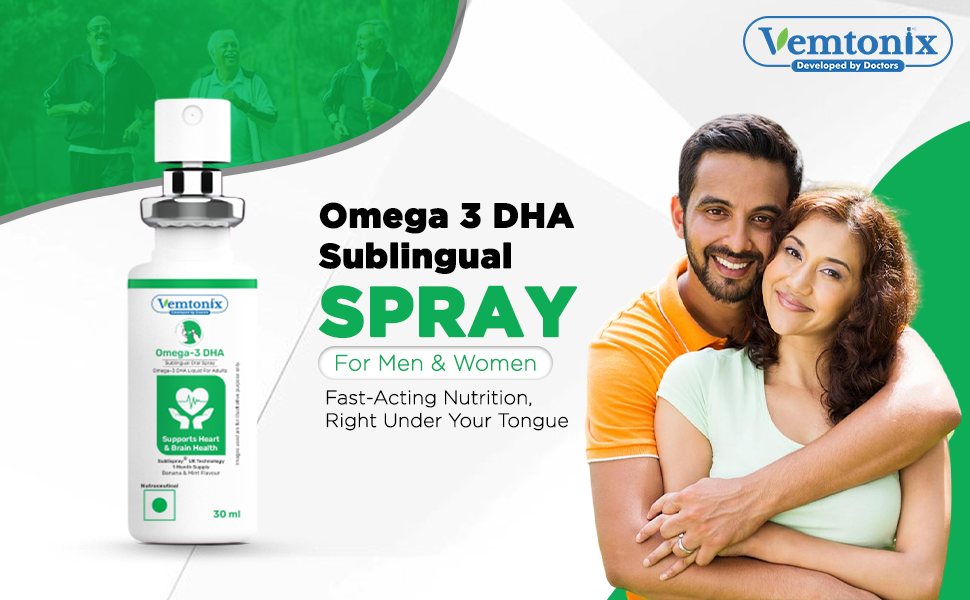Everything You Need to Know About Omega-3 Supplements
Ever walk past the supplement aisle and get completely overwhelmed by all those fish oil bottles? There's like fifty different brands, all claiming theirs is the best, and half of them smell like low tide when you open the bottle. Yeah, we've been there too, standing there trying to figure out what the heck EPA and DHA even mean.
Here's the thing though – omega-3s are actually pretty important for your brain, heart, and basically everything else going on inside your body. But the supplement game is honestly a mess of confusing labels, fishy burps, and products that may or may not actually work.
We've been diving deep into the Omega 3 DHA sublingual oral spray world at Vemtonix, and there's way more to this story than just grabbing whatever fish oil is on sale. Especially if you're trying to avoid animal products or you're just tired of those giant horse pills that make you taste fish all day.

What's the Deal With Omega-3s Anyway?
Your body's basically like a really complex machine that needs specific fuel to run right. Omega-3 fatty acids are some of that fuel, but here's the kicker – your body can't make them on its own. You have to get them from food or supplements; otherwise, things start going sideways.
There are three main types you hear about: ALA (from plants like flax seeds), EPA, and DHA (usually from fish). The EPA and DHA in fish originate in algae. Smaller fish eat the algae, and it moves up the food chain from there. So really, fish are just the middleman getting omega-3s from algae anyway.
EPA and DHA are the heavy hitters for heart and brain health. ALA from plants is fine, but your body has to convert it to EPA and DHA, and it's pretty bad at that conversion. Like, really bad – we're talking maybe 5-10% efficiency on a good day.
Signs you might need more omega-3s:
- Brain fog that won't quit
- Dry, flaky skin
- Joint stiffness
- Trouble focusing
- Mood swings for no obvious reason
- The Fish Oil Problem Nobody Talks About
Let's be honest about traditional fish oil supplements for a minute. Most people buy them, take them for maybe two weeks, then quit because of the burps. You know what we're talking about – that lovely fishy aftertaste that shows up hours later and makes you question your life choices.
But the real problem runs deeper than just taste issues. Lots of fish oil supplements are made from fish that's been sitting around processing facilities for who knows how long. By the time it gets turned into capsules, the oils are often rancid, which means they can actually cause more inflammation instead of reducing it.
Plus, there's the whole sustainability thing. Overfishing is a real problem, and some of these supplement companies are basically strip-mining the oceans for fish oil. Not exactly what you want to support when you're trying to be healthier.
Then you've got the absorption issues. Traditional fish oil capsules often pass through your system without doing much good. Your body has to break down the capsule, process the oil through your digestive system, and hope enough makes it into your bloodstream to actually help.

Why Plant-Based Omega 3 Spray Changes Everything
This is where things get interesting, and it's something that's been flying under the radar for way too long. Marine algae, particularly microalgae, are another triglyceride source of EPA and DHA. Basically, algae makes the omega-3s that fish get famous for, so why not skip the fish and go straight to the source?
A vegan omega supplement made from algae solves pretty much every problem with traditional fish oil. No fishy taste, no burps, no ocean depletion, and often better absorption because it's in a more bioavailable form.
But here's where it gets really smart: Omega 3 DHA sublingual oral spray delivery. Instead of hoping your digestive system cooperates, the omega-3s get absorbed directly through the tissues under your tongue. We're talking about way better bioavailability and none of the digestive drama that comes with pills.

The Real Comparison: What Actually Gets Into Your System
Since we've been tracking different omega-3 delivery methods, here's what the numbers actually look like:
|
Method |
Absorption Rate |
Fishy Aftertaste |
Environmental Impact |
Convenience |
|
Fish Oil Capsules |
30-40% |
High |
High (overfishing) |
Low (large pills) |
|
Liquid Fish Oil |
50-60% |
Very High |
High |
Low (messy, taste) |
|
Algae Capsules |
40-50% |
None |
Low |
Moderate |
|
Plant-Based Omega 3 Spray |
70-85% |
None |
Very Low |
High |
The spray route wins pretty much across the board. Better absorption, no taste issues, sustainable sourcing, and way easier to use consistently.
Algae oil usually contains more DHA than fish oil, which makes it a good choice for those focusing on brain health, cognitive function, or eye health. So you're often getting more of the good stuff per dose compared to fish-derived options.

What to Look for in a Quality Omega-3 Supplement
Not all omega-3 supplements are created equal, and there's definitely some sketchy stuff out there trying to cash in on people who just want to be healthier.
For a solid sublingual omega 3 for vegans, you want to see clear EPA and DHA amounts listed on the label. Avoid anything that just says "omega-3 blend" without breaking down the actual useful stuff. The total omega-3 number is basically meaningless if it's mostly filler oils.
Quality markers for omega-3 supplements:
- Specific EPA and DHA amounts listed
- Third-party testing for purity
- Algae-sourced for sustainability
- Glass packaging (protects from light damage)
- No artificial fishy flavoring (red flag for quality issues)
The dosing should make sense for your needs. Most people do fine with 500-1000mg combined EPA and DHA daily, but if you're dealing with inflammation issues or following a completely plant-based diet, you might need more.

The Vegan Omega-3 Reality Check
Let's talk about something that trips up a lot of people switching to plant-based supplements. A vegan omega supplement isn't automatically better just because it's vegan – the quality and bioavailability still matter enormously.
Some companies use flaxseed oil or other ALA sources and call them omega-3 supplements, but remember, your body sucks at converting ALA to the EPA and DHA you actually need. You want algae-derived EPA and DHA specifically, not just any plant omega-3.
The good news is that quality algae-based supplements often outperform fish oil in terms of purity and potency. When it comes to environmental impact, plant-based algae omega-3 is generally considered to be the better option compared to fish omega-3, plus you're not dealing with potential mercury or other ocean contaminants.
The Absorption Game Changer
Here's something most supplement companies don't want to advertise: most omega-3 pills don't get absorbed very well. Your digestive system breaks down maybe 30-50% of what you swallow, and the rest just gets expensive pee.
Omega 3 DHA sublingual oral spray bypasses that whole digestive lottery. New research suggests liquid fish oil may deliver better results compared to capsules, and sublingual delivery takes that advantage even further by getting nutrients directly into your bloodstream through mouth tissues.
We've seen people who switched from pills to spray supplements notice differences within a week or two because they're actually absorbing most of what they're taking instead of hoping their stomach cooperates.
Common Mistakes That Waste Your Money
Here's what we see all the time: people buy cheap omega-3 supplements, take them inconsistently, then wonder why they don't feel any different. Or they get the massive horse pills, can't swallow them, and the bottle sits in the cabinet gathering dust.
The other big mistake is assuming all omega-3 sources are the same. That bargain fish oil that smells like a marina is probably rancid and could actually increase inflammation instead of helping.
Timing matters too, but not in the way most people think. Consistency beats perfect timing every single time. It's better to use a plant-based omega 3 spray every day for months than to take mega-doses sporadically and expect magic.
Why Sprays Are Taking Over
We've watched the supplement industry for years now, and there's definitely a shift happening toward sublingual delivery methods. People are getting tired of fighting with pills that don't work or taste terrible.
A sublingual omega 3 for vegans solves pretty much every complaint we hear about traditional supplements: hard to swallow, bad taste, questionable absorption, environmental concerns. Quick spray under your tongue, you're done, and you actually know the nutrients are getting where they need to go.
The convenience factor is huge too. No water needed, no timing with meals, no choking down giant capsules. Just like vitamin B12 absorption works better sublingually, omega-3s get into your system faster and more efficiently when they don't have to survive the digestive gauntlet.

The Bottom Line on Omega-3 Supplements
Look, omega-3s are important enough that you should probably be taking them if you're not eating fatty fish multiple times a week. But the delivery method makes a massive difference in whether you actually get any benefit.
Traditional fish oil has sustainability issues, absorption problems, and let's be honest, it's pretty gross to take consistently. Algae-based alternatives solve those problems while often delivering better results.
If you're serious about actually improving your health instead of just going through the supplement motions, the spray route makes the most sense. Better absorption, easier to use consistently, sustainable sourcing, and no fishy burps. Your brain care, heart care , and taste buds will thank you.


